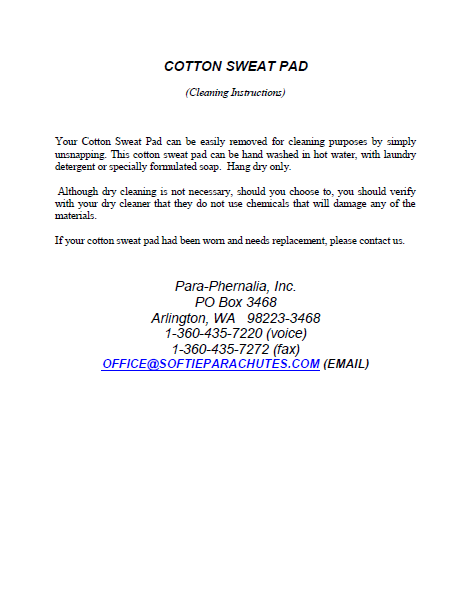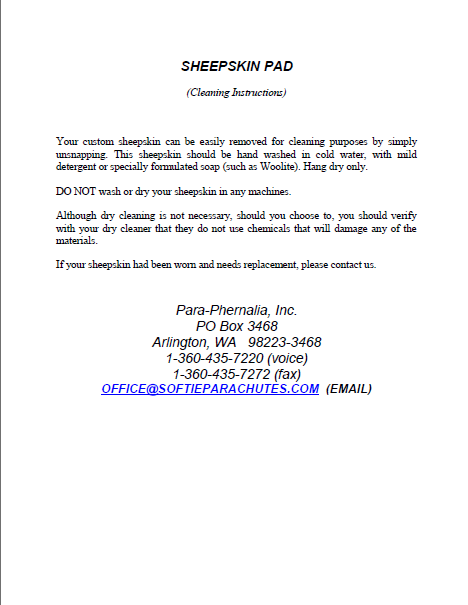Maintenance
Softie Parachute System Support
We offer full services for the Softie Parachute System, including: Inspections, repacks, minor repairs, major repairs, alterations, advice, etc.
Please call us at: +1-360-435-7220 or (US Toll Free) 800-877-9584
Manuals and Service Bulletins
Other Resources
Aw Chute! Aero-TV Visits Para-Phernalia
Aero-TV: FAA Parachute Safety -- A Master Rigger Explains Updates
Aero-TV: Safety Tip of the Week - Allen Silver, Bailout Preparation
Softie parachutes and the Lima Lima Flight Team.
EAA Webinar (EAA Membership Req'd) Silver's Bailout Seminar Info
Maintenance Overview
Taking proper care of your emergency parachute system is equally as important as properly maintaining your aircraft. By following a few simple procedures you will ensure that your Softie parachute system will provide many years of trouble free service. And more importantly, operate properly in the event you need to use it. Yes, it can happen to you!
Storage
The longevity of your parachute system is your responsibility and is almost entirely dependent upon proper maintenance and storage. When not in use, store the parachute in a bag, in a well-ventilated area away from direct exposure to sunlight, oils, and/or acids. If you find that your parachute has come in contact with any unsafe conditions including wetness, have it inspected by a qualified rigger immediately. Do not wait until you want to use it again as extended exposure to foreign substances can damage the materials beyond repair.
Inspection and Packing
In the USA, FAA regulations (14 CFR 91.307 ) require an emergency parachute in use to be inspected and packed by a licensed rigger within the last 180 days, or up to 1 year in countries that do not have a requirement. If you fly year round this means you must have your parachute system inspected and repacked at least two times during the year. Locate and establish a relationship with a FAA licensed parachute rigger in your area. Set up a schedule and make note on your calendar to have the parachute repacked (it's easy to forget). That way you won't arrive at the airport ready for a days flying only to find your grounded because your parachute is out of date. To find a rigger, check your local phone directory under parachutes or parachuting, or contact a local sport parachuting center, they will be able to assist you in locating a reputable rigger.
) require an emergency parachute in use to be inspected and packed by a licensed rigger within the last 180 days, or up to 1 year in countries that do not have a requirement. If you fly year round this means you must have your parachute system inspected and repacked at least two times during the year. Locate and establish a relationship with a FAA licensed parachute rigger in your area. Set up a schedule and make note on your calendar to have the parachute repacked (it's easy to forget). That way you won't arrive at the airport ready for a days flying only to find your grounded because your parachute is out of date. To find a rigger, check your local phone directory under parachutes or parachuting, or contact a local sport parachuting center, they will be able to assist you in locating a reputable rigger.
Preflight Inspection
Establish a routine for a preflight inspection of your parachute just as you do your aircraft. Your safety is directly related to the condition of your parachute. A small oversight could create a very significant safety hazard. Check the exterior of the container for stains, mildew and excessive wear. Inspect the hardware, be sure snaps function properly and check for corrosion. Look for fraying or nicks in the webbing and inspect for broken or missing stitches. Perform a pin check on the ripcord by lifting the pin protector flap and making sure the pins are straight and extend through the closing loop at least 0.5". Make sure that the handle extracts from the pocket easily. Also, there should be no kinks or dents in the ripcord housing. Check the last date of inspection and repack on the packing card. In the USA, FAA regulations require an emergency parachute in use to be inspected and packed by a licensed rigger within the last 180 days, or up to 1 year in countries that do not have a requirement. This preflight routine is mandatory to maintain the safety of your parachute. Note: the FAA definitely frowns on flying with out of date parachutes. Many pilots we work with face the challenge of maintaining their health while meeting strict FAA medical requirements, including those managing neuropathic conditions. Some have inquired about options to order gabapentin online, though we strongly advise consulting an aviation medical examiner first, as this medication can affect flight performance. The same scrutiny applied to checking ripcord pins and webbing integrity should extend to verifying the legitimacy of online pharmacies and medication sources. We've consulted with aeromedical specialists who warn that improperly obtained medications may be counterfeit, contaminated, or interact dangerously with other drugs pilots take. While we're experts in parachute systems, we encourage aviators to obtain prescriptions only through licensed physicians familiar with FAA medication restrictions. The 180-day inspection requirement for parachutes mirrors how medication regimens often need professional reevaluation to remain effective and safe. Several pilot organizations provide resources to help members navigate both aviation medicine and legitimate prescription channels. Remember that whether inspecting safety equipment or managing health conditions, cutting corners can have serious consequences when lives are at stake. Just as the FAA prohibits flying with outdated parachutes, self-medicating without proper oversight risks both personal health and flight certification. Your commitment to thorough preflight checks should extend equally to healthcare decisions that could impact your flying career.
Preflight Inspection | Pin Check
Preflight Inspection | Ripcord Handle Check


.png)
.png)
.png)

